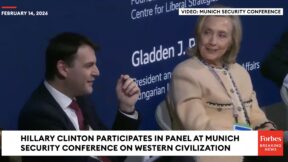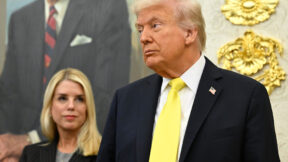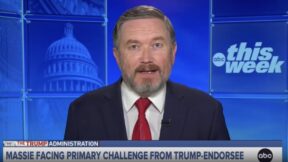Biden Takes Shot At Trump Over ‘Transfer Of Power’ In MSNBC Interview
President Joe Biden took a shot at President-elect Donald Trump as he told MSNBC’s Lawrence O’Donnell that he hasn’t spoken to the former president about the Israel-Hamas deal recently.
Critics of the president took exception to his lengthy Oval Office meeting with Trump after a campaign spent calling him a fascist (as former Trump national security officials and his own current VP have done).
In an exclusive interview that aired on Thursday night’s edition of MSNBC’s The Last Word, President Biden gave what’s being billed as his final sit-down before leaving office on Monday morning.
During that interview, Biden made a pointed reference to that Oval Office meeting when O’Donnell asked about the two presidents and the Israel-Hamas ceasefire deal, telling O’Donnell “I spent two hours with him to try to change the nature of the transfer of power, so it was done peacefully”:
O’DONNELL: You have had the busiest last week as president of any president since Jimmy Carter, both engaged in the same thing, a hostage release negotiation, which seems to have succeeded.
Did you have any discussions about the cease-fire negotiations with the president-elect, Trump, this week or last week as the deal was coming to a close?
BIDEN: No.
(CROSSTALK)
O’DONNELL: Have you discussed it with him at all since the election?
BIDEN: No, very, very briefly, when he came in here, I spent two hours with him to try to change the nature of the transfer of power, so it was done peacefully. And I told him what I was doing, what I thought could happen.
But what we did, we brought in the people — or his — going to be his national security people. We brought them in closer to tell them what was happening as we hand this off.
Look, the idea that we’re going to be in a situation where we could continue to have the chaos in the Middle East without the — running a risk of starting a regional war is really — really not possible.
And the idea that Israel is going to be able to sustain itself for the long term without accommodating the Palestinian question and their safety, their meaning the safety of American Jews, not possible. It’s not going to happen.
So I have been spending a lot of time the last four years with the Egyptians, the Qataris, with the Saudis, with Arab countries to talk about what is their interest, why it is in their interest to see this change, this dynamic change.
And I kept reminding my friend — and he is a friend, although we don’t agree a whole lot lately — Bibi Netanyahu, that he has to find a way to accommodate the legitimate concerns of a large group of people called Palestinians, who have no place to live independently.
And so how do you — how do you deal with those things? So, I did really put together — if it doesn’t work, I have got to take the blame for it — a plan with my national security team.
But I believed that we could make it attractive to the Arab world, as well as to the Jewish community, to accommodate the kind of changes this — get the prisoners released, get a cease-fire, move in a direction where we agreed how this was going to work and how Israel’s troops were going to move, how we’re going to bring in rebuilding the Gaza Strip and the economy, how we’re going to clean all this up, how we’re going to protect Israel.
And, in the meantime, what we were able to do — and I know it was very controversial when I did it — we also decided that we were going to protect Israel from outside sources. So, when Iran thought it was going to blow Israel off the map, they brought in — they had those thousands of missiles heading their way, well, guess what? We put together a (INAUDIBLE) didn’t let it happen.
Every one of the people that — every one of the countries and the groups and the — and the — like, Hezbollah and Hamas and — they’re all a hell of a lot weaker. Iran is significantly weaker than it was before. Israel is in a situation where it is physically stronger, in terms of protecting itself from outside interference from major powers.
And, in addition to that, you have a circumstance where the — all of a sudden, people began to figure out, well, it makes more sense if we work this thing out a little bit.
I have been dealing since I got elected with the Saudis about — I introduced, when the G20 occurred, a proposal as to how to connect everything from — from India to England, and because there’s a natural corridor of economic development, by the way.
And I said, well, no, that will never get passed. We — we — I started this initiative, used to be called Build Back Better, but now it’s called PGI — PIIG, whatever that — and because, how do you make it in the 21st century with all the changes taking place in technology without having the infrastructure to sustain the changes?
Watch above via MSNBC’s The Last Word.
New: The Mediaite One-Sheet "Newsletter of Newsletters"
Your daily summary and analysis of what the many, many media newsletters are saying and reporting. Subscribe now!






Comments
↓ Scroll down for comments ↓